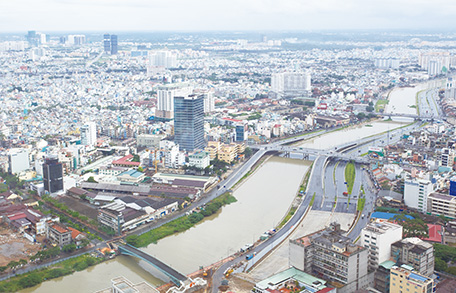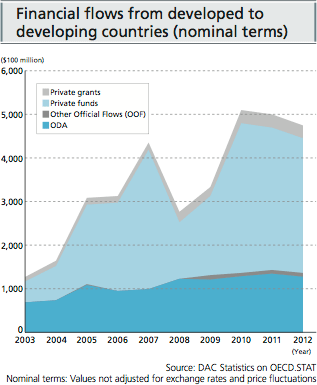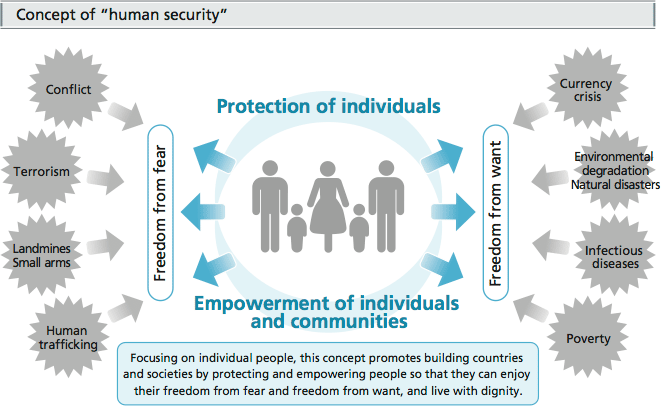Japan's Official Development Assistance White Paper 2013
Part I International Cooperation as Investment in the Future
Chapter 1 The Role of ODA in a Changing International Landscape

Ho Chi Minh City overlooking the Saigon East-West highway tunnel under construction in Viet Nam (Photo: Hikaru Nagatake / JICA)
Section 1 Developing Countries and ODA in a Global Economy
October 2014 will mark the 60th anniversary since the start of Japan’s technical cooperation to developing countries. Japan has so far extended bilateral aid to 169 countries and 21 regions, as well as assistance through contributions to Multilateral Development Banks (MDBs), including the World Bank and the Asian Development Bank (ADB) and to United Nations (UN) agencies, including the United Nations Development Programme (UNDP), United Nations Educational, Scientific and Cultural Organization (UNESCO), United Nations Children’s Fund (UNICEF), World Health Organization (WHO), World Food Programme (WFP), and the Office of the United Nations High Commissioner for Refugees (UNHCR). How does the world and developing countries view the assistance Japan has provided? Every year, BBC, a public service broadcaster in the United Kingdom, carries out the Country Ratings Poll that surveys whether countries have positive or negative influences on the world. Every year, Japan ranks among the top countries viewed as a positive influencer on the world. Recently, Japan was ranked in the first place in 2008 and 2012. These positive perceptions of Japan are largely underpinned by the international cooperation Japan has extended, including ODA. In a 2008 opinion poll on Japan conducted in six key ASEAN countries to which Japan has offered substantial ODA, 92% of those polled assessed that Japan’s ODA is helpful in the development of their countries, while 93% considered Japan as a trustworthy friend for ASEAN countries. Among the messages of support which were received from around the world in the aftermath of the 2011 Great East Japan Earthquake, numerous messages expressed gratitude for Japan’s help when their own countries were hit by disasters and for Japan’s support to their countries’ development. These are all a testament to the significant role Japan’s assistance in the last 60 years has played in strengthening international trust in Japan.
At the same time, considerations of what Japan’s ODA should look like now and in the future must take into account the recent major changes taking place in the international landscape surrounding Japan. One of the changes is the changes in the political and national security environment. In the midst of heightening popular calls for democratic systems throughout the world, it is demanded that Japan carry out an increasingly strategic diplomacy for shaping an international order based on universal values, such as freedom, democracy, and the rule of law. ODA is one of the most important tools to this end. Japan can promote and foster these favorable developments by strengthening support through ODA for countries with which Japan shares universal values and strategic interests, and for countries in the process of democratization and national reconciliation.
Changes in the international landscape have also been striking on the economic development front. Until the early 2000s, as private financing inflows could not be expected, many countries, especially in Africa, had to rely on ODA for most of their countries’ development. This situation has, however, changed completely with the later changes in the global political and economic circumstances. As civil wars and coup d’etats decreased and the political and security situation improved, coupled with the advancement of economic globalization, many developing countries increasingly attracted attention as new investment destinations and markets amid rising natural resource prices and primary product prices, among other factors. Private financing flows to these countries in turn began to exceed ODA flows. As shown in the graph “Financial Flows from Developed to Developing Countries (Nominal Terms),” private financing inflows to developing countries were approximately 2.5 times as big as the ODA inflows in 2012. With private financing emerging as a new driving force in addition to ODA, developing countries have been realizing remarkable economic growth, which has been driving the global economy. In Africa – a continent that had suffered from poverty, a succession of countries have achieved annual growth rates of above 5%. Against this backdrop, during the Fifth Tokyo International Conference on African Development (TICAD V) held in Yokohama in June 2013, many African leaders called for Japanese companies to increase their investments in the countries, which have identified private financing-led growth through trade and investment as a national goal.

Furthermore, the so-called emerging countries, including China, India, and Brazil, have registered spectacular economic growth and are strengthening their global presence. As a result of economic growth through trade and investment, these countries saw sharp declines in their poverty, and made substantial contributions to the achievement of the Millennium Development Goals (MDGs) . These countries are in a position of offering development financing, and have dramatically increased their contributions for development in recent years.
Another area that needs to be looked at is the world’s transition towards even greater diversity and multipolarity. While there are developing countries that achieve many of the MDGs, conversely there are still numerous countries which do not see adequate progress in achieving these goals. These are countries that lag behind in development due to various circumstances such as regional conflicts and civil war, and must continue to rely on ODA. In addition, there are countries like Myanmar embarking on a process of building a democratic state. These countries which promote democratization and aspire to grow based on an open economy not only have tremendous needs for development cooperation through ODA; they are also anticipated to witness dramatic economic growth through future increases in private sector investment, undergirded by rapid improvements in the investment environment. On the other hand, in some countries which have steady economic growth, poverty is still a serious issue due to widening intra-country disparities. It is imperative that assistance also addresses the hardships faced by these countries.

Children in Sodo, Southern Nations, Nationalities, and Peoples’ Region, Ethiopia (Photo: Kenshiro Imamura / JICA)
The advancement of globalization is, furthermore, accelerating the integration and interdependence of world economies. This is yet another critical aspect to consider in examining the future role of ODA. In the present era, an array of worldwide risks can have significant impacts on the entire world economy. These are not restricted to risks that originate from developed countries, such as the global economic crisis and the European debt crisis. Today, when investment money also reaches across developing countries, developing country risks can immediately set off ripple effects on the entire world economy, including geopolitical risks, such as regional conflict and terrorism threat, and sovereign risks related to national credit. It is not an exaggeration to say that for Japan and for the entire globe, no localized risk in the world may be considered “somebody else’s problem.”
In this changing international landscape, the role demanded of Japan’s ODA is changing qualitatively.
First, as private financing assumes a greater role for achieving sustainable growth in developing countries, in recent years there have been growing expectations towards ODA’s catalytic role for attracting private financing and towards ODA’s role for creating an investment-friendly environment. Increases in direct investment in developing countries contribute to the transfer of technologies and knowhow to developing countries, as well as to increases in employment and income in developing countries. By unlocking the vitality of local companies in developing countries, Japan will support their sustainable economic growth. Specifically, Japan will further strengthen programs such as infrastructure development that contribute to improving the business environment of developing countries, the development of industry human resources in developing countries, and public-private partnerships including BOP (Base of the economic Pyramid) business support (Note 1). This type of ODA, which attaches importance to aspects of growth, is consistent with the principles of development cooperation for developing countries that Japan has been promoting.
Secondly, the role demanded of ODA has diversified as the world becomes more diverse and multipolar. For countries where private financing inflows cannot be expected, it remains important that a stronger focus is placed on poverty reduction, and that Japan carries out development cooperation based on the principle of human security, including technical cooperation for human resource development. Many of the challenges confronting these countries are global issues, such as regional conflict, infectious diseases, and climate change, that are bound to affect the whole world, including Japan. Japan’s proactive engagement in these fields will contribute to strengthening trust in Japan as well as Japan’s presence in the international community. Moreover, supporting countries embarking on a process of building a democratic nation through ODA promotes the shaping of an international order which is in line with universal values, such as freedom and democracy, and is expected to greatly contribute to the realization of a free and prosperous international community.
Thirdly, with the integration and interdependence of the world economy deepening, the issues of developing countries are no longer confined to developing countries. In an increasing number of cases, developed economies have benefited from, or have been conversely affected in a negative manner by, causes attributable to developing countries. Amid stagnant growth in developed economies, an era has arrived in which the economic growth of developing countries determines the fate of the growth of the entire world economy. Realizing balanced, sustainable, and resilient economic growth in developing countries is now an essential prerequisite for ensuring stable development and prosperity across the world, including Japan. Under these circumstances, what has come to light once again is that assistance for developing countries via ODA benefits not only developing countries, but also the entire international community, including developed countries. The assistance needs of developing countries are diverse, ranging from economic infrastructure assistance that will likely have short-term effects on the world economy, to areas requiring long-term efforts, including poverty reduction and peacebuilding. By addressing these needs of developing countries, its impacts will be passed on to the entire international community in the form of international economic growth and peace and stability. Looking ahead to 10 years and 20 years from now, ODA is an important “investment in the future” for developing countries to become independent and to develop, and to ensure that this development serves as a springboard for growth for the world as a whole.
For Japan, these ODA concepts are, in a sense, familiar concepts. In the wake of the dramatic landscape changes, a similar understanding of ODA has also become widespread in other donor countries. Mr. J. Brian Atwood, previous Chair of the Development Assistance Committee of the Organisation for Economic Co-operation and Development (OECD), who has also served as the Administrator of the United States Agency for International Development (USAID), setting forth in an article he contributed in 2012 that “development assistance is an investment in the future,” urged the international community to increase ODA and argued that “If we want growth in the OECD countries, we have to adopt a global perspective that encompasses the developing world.”
Even in the United Kingdom which, if one or the other, had taken the position that development aid makes too sharp a distinction between national and global interests and that development should be for the latter, the Secretaries of State for International Development since the inauguration of the Cameron administration have stated that “the development assistance budget is investment in the future for developing countries and the United Kingdom,” and have strongly advocated the need for increases in the ODA budget. It follows that this notion that ODA is investment in the future for the further development of not only developing countries but also of the entire international community is being shared increasingly across the globe. Japan, from this standpoint, will carry out ODA that contributes to the development of developing countries, as well as to the growth and prosperity of the entire international community, including developed countries.

Note 1: See this page about BOP business
